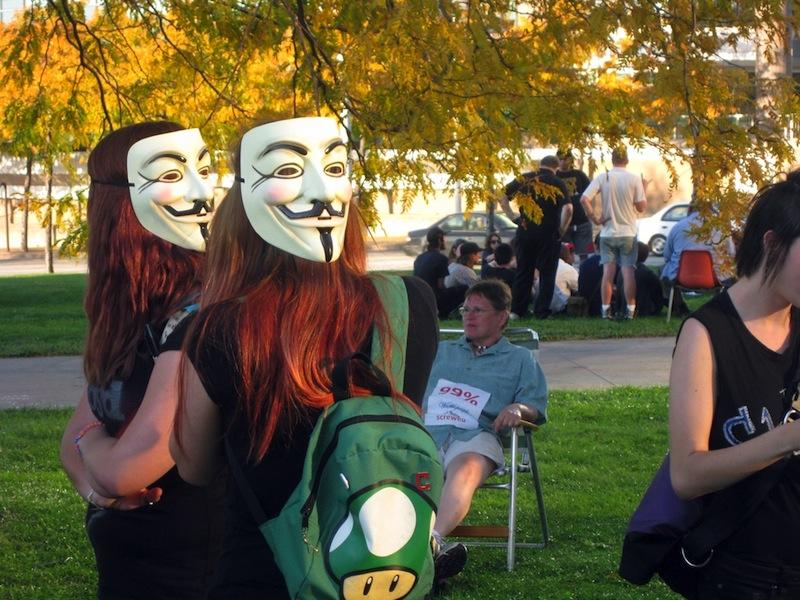Occupy Cleveland Inspires Despite Small Crowd
October 14, 2011
Some 150 people, including at least a dozen Oberlin students, gathered in downtown Cleveland’s Willard Park last Saturday to hold one of Occupy Cleveland’s first general assemblies since the group’s formation two days earlier.
A series of speakers urged attendees to form outreach groups and involve their communities in the movement. The consensus building style of the assembly was very similar to that used by the Oberlin Student Cooperative Association but drew a far more diverse cross-section of participants.
SAM JEWLER
Occupying Cleveland
Oberlin students stood among Ohio residents in support of the Occupy Cleveland movement, an offshoot of Occupy Wall Street.
One young man invited people to join his outreach group, which he will use to try to recruit people to Occupy’s cause from Cleveland communities of color and poverty — “which are unfortunately a lot of the same communities.”
An elderly man wearing a Troublemakers Union t-shirt fiercely entreated any union members in the crowd to “not ask, but demand that your union get involved. And if they can’t or won’t, ask that they at least not get in the way.”
A middle-aged black woman with a sign reading, “Seriously! Does Congress need to be convinced to pass the jobs bill [?]” told the crowd, “I came here today to protest and did not know you all would be here, but God bless you for being here. As a senior citizen here with all you beautiful young people, remember you are here today because nothing else was working.”
Then a shirtless young man with a mohawk invited people to join his direct action group, saying, “This isn’t a revolution without action and resistance.”
The resistance to police presence has been low here, however, compared to occupations in cities like New York and Boston. At this assembly the occupiers unanimously agreed to comply with the police’s request that they sleep on the sidewalks instead of the grass of the park. One person opined that the issue of police involvement in the occupation should be brought before the group frequently, while another got applause for saying, “We need to respect the police as part of the 99 percent.” “The 99 percent” is Occupy shorthand for the vast majority of Americans who are outside of the top 1 percent income bracket that controls a third of the U.S.’s wealth.
That feeling seemed to be mutual. Officer Stiegelmeyer of the Cleveland Police Department stood watching the crowd from a distance and occasionally chatting with protesters.
“Awesome people here,” he said, “awesome people. I sympathize with them. I look at the little kids here and think about my son, my daughter — what are they going to do when they’re my age? … I don’t like to be looked at as an institution. I’m an American like everyone else. We breathe the same air, we pay the same taxes and what happens affects us all, whether good or bad. We are a symbol of law and order, but how is that law and order used? Is it for good or greed?”
As he walked away, Stiegelmeyer said he would probably come back to the protest in his off-duty time.
The event was relatively tranquil, with the one exception of a man who began yelling at protesters in front of a Fox 8 news camera. As a circle gathered around them and tensions rose, a man took to a microphone and called for everyone to walk away.
“Don’t feed the trolls!” he said. “The more anger that gets thrown in makes us look bad and gives fodder for Fox to make us look bad.”
As the crowd calmed down, some people gathered around a drum circle while others snacked on food from the Food Not Bombs table, did yoga or received free massages.
Thirty-seven-year-old Scott Yerger tended to people on his massage chair all afternoon, receiving overwhelmingly positive reviews including “This guy is amazing” and “Did we just have sex?”
Yerger is legally blind, and fears that the current shift toward fiscal austerity will jeopardize the government assistance he needs to survive.
“We need change,” he said, “and this is a very positive way to achieve that.”
Yerger had raised about $50 in donations in just a few hours, and plans to give all donations to Occupy Cleveland. He said he will be around to give massages six days a week at the occupation’s home in Cleveland Public Square.
“It’s not about me,” he said. “It’s about everybody. This is my way of being able to give back.”


























